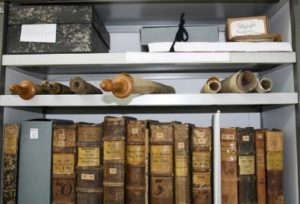Hidden treasures. Television shows like ‘Antiques Roadshow’ are popular because we’d all like to think that among the bric-a-brac in our basements may be hidden a gem. And every once in a while there is one. After all, ‘Antiques Roadshow’ wouldn’t be fun to watch if every item turned out to be worthless.
Then there are the cases where a building knowingly holds valuable items, but people don’t recognize just how valuable — or special — these items are.
That was the case at the Martinus Library in Mainz, Germany, as Marcy Oster recently reported for JTA. It took an Israeli doctoral candidate visiting there to identity the rarity of three centuries-old scrolls the library had just sitting on its shelves.Leor Jacobi, a doctoral candidate in Jewish art at Israel’s Bar-Ilan University, visited Mainz in March. He was there as a guest of the Johannes Gutenberg University to study the particular Mainz version of the Yom Kippur prayer book.
While at the Martinus Library, he viewed its collection of Judaica — and then library director Helmut Hinkel brought out three scrolls that were never catalogued and asked Jacobi to tell him what they were.
Jacobi determined that two of the scrolls were Ashkenazi versions of the Book of Esther that were at least 200 years old. The third was the beginning of a Samaritan Torah scroll, including the chapters of Genesis and Noah.
Like any good ‘Antiques Roadshow’ episode, there needs to be a good origin story.
In the Mainz case, it was that the scrolls had been purchased from a souvenir dealer for about $25 by Nikolaus Adler, a Catholic priest in Mainz who died in 1970, while he was on a visit to Israel in the 1960s. Adler said they had been sitting on a shelf in his former library office in the library for 50 years.
Jacobi wrote a one-page summary about each of the scrolls for the library, so that future visitors would understand their meaning.
Not long after he returned to Israel, Jacobi got a call from Hinkel asking if he would like to help the Mainz library give the scrolls to a library in Israel. Jacobi arranged for the scrolls to be housed at the National Library of Israel.
The episode’s final twist (the best episodes always have one): When Jacobi was back in Germany to accept the scrolls, he was handed a fourth scroll, which had been discovered behind some of the books on that same dusty shelf. And this one was a bit rarer: a Song of Songs scroll.













